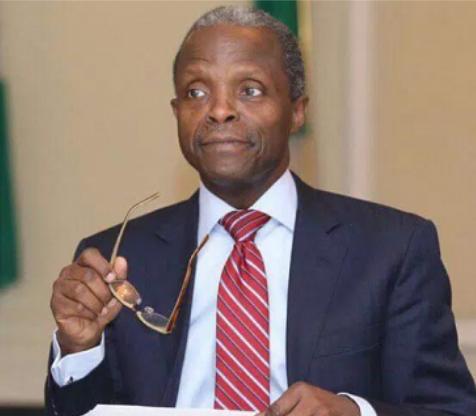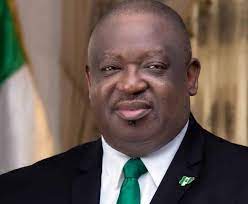NEWS
FCT, 23 States Receive N24bn Conditional Grant Schemes – SDGs

By Mathew Dadiya, Abuja
The Senior Special Assistant (SSA) to the President on Sustainable Development Goals (SDGs), Mrs. Adejoke Orelope-Adefulire, Thursday disclosed that Twenty-three states of the Federation and the Federal Capital Territory (FCT) have received N24,450,000,000.
00 from the Conditional Grant Schemes as incentive to invest more of their resources into areas of national development priorities and the Millennium Development Goals(MDGs)/Sustainable Development Goals (MDGs).The fund, according to the MDGs boss, disbursed from 2015 till date, was introduced in 2007 with a 50 percent marching grant from the federal government and 50 percent from the participating states.
Mrs. Orelope-Adefulire, announced this while during the Ministerial Media Briefing organized by the Presidential Communications Team at the Presidential Villa, Abuja.
She explained that the grants were targeted at education, health, water and sanitation projects “and aimed at executing pro-poor projects in a consultative manner with the beneficiaries.”
The MDGs boss said that the money was spent on the implementation of 732 water and sanitation facilities; 494 health facilities (new facilities and renovation/rehabilitation); 616 education facilities (new construction, renovation/rehabilitation of block of classrooms; 1,150 women and men were empowered/trained in vocational skills, such as sewing, knitting, detergent & pomade making etc.)
There were special intervention projects across the geo-political zones, an initiative, she affirmed, was aimed at strategic investment to fast-track the achievement of the SDGs in Nigeria, she said.
Mrs. Orelope-Adefulire: “Between 2016 and 2021, a record number of projects have been implemented, aimed at providing essential services to accelerate the achievement of the SDGs, by ensuring no Nigerian is left behind.
“In the education sector, 8,008 classrooms constructed and 305 renovated with furnishing to strengthen basic education across the country.
“A total of 4,845 Desktop and Laptop Computers have also been supplied to schools across the country for Information and Communication Technology (ICT) training.
“In the health sector, 195 Health Centres, comprising Primary Healthcare Centres (PHC) and Mother and Child Centres (MCC) were constructed, complemented with the supply of 199 Intensive Care and Rural ambulances. About 257 incubators and 7,464 regular and automated hospital beds were supplied across tour health facilities.
“In other cross-cutting sectors, OSSAP-SDGs constructed 66 Vocational and Skills Acquisition Centres; supplied 1,294 transformers; provision of 19,266 solar-powered streetlights; 300 Housing units for internally displaced persons (IDP) in Borno State; and 925 Solar Boreholes, in addition to several other interventions.”
Orelope-Adefulire also spoke on some findings from 2020 voluntarily national review, indicating that from Nigeria’s 2nd Voluntary National Review (VNR) 2020 on SDG-3, while the country faces challenges on health outcomes, such as high rates of maternal mortality, there have been significant reduction in the under-five mortality rates (from 157 to 132).
The presidential aide disclosed that Nigeria’s current access to basic drinking water now stands at 64% as according to her, the review emphasised the need for more investment in public health and to ensure the most vulnerable are reached through universal access to basic healthcare services.
“On SDG-4, a key challenge confronting the country has to do with Out-of- School-Children, a demographic challenge that relates to an interplay between employment (SDG-8), education (SDG-4), poverty (SDG-1) and the digital economy (SDG-17). With a population of approximately 200 million people, regional disparities are significant.
“On SDG-8, Nigeria’s informal economy is one of the largest on the continent – estimated at 53% of the Labour force and accounting for 65% of GDP. It is estimated that 75% of all new jobs are informal. Ensuring youth are well-trained and able to transition to productive employment through the digital economy can help reduce poverty and help diversify growth away from oil and gas.
“In addition, the Nigerian government can dramatically shift to digitization and strengthening its transition to e-government to facilitate its social protection to the poor and vulnerable population,” the MDGs boss added.
On ending poverty in all its forms everywhere, reducing poverty and sharing prosperity under SDGs Goal 1, she said the federal government has maintained steady investment in expenditure in health, education, and other social services between 2015 and 2018 “because investments in these areas are essential and integral to addressing poverty.
“With about 10.8 million out of school children and more people drifting into poverty, Nigeria’s expenditure on education just about 8.6 percent in 2015 and witnessed a steady decline to 8.2, 8.5 and 8.2 percent in 2016, 2017 and 2018.
“This was largely due the 2016 economic recession and the decline in global oil prices and COVID-19 pandemic,” she added.
On Goal 2 of Zero Hunger, the presidential aide stated: “Findings from the baseline showed that the prevalence of undernourishment in 2016 for stunting, moderate stunting and severe stunting were 32.9 percent, 20.4 percent and 12.5 percent respectively, while in 2019 the report indicated 32 percent stunting, and 21.2 and 10.8 percent for moderate and severe stunting respectively.
Thus, we had modest decrease in severe stunting.”
On Goal 3, which is Ensure Healthy Lives and Promote Well-Being for all at all Ages, she said the summary of the baseline indicated that the rate of under-five mortality rate (meaning that for any child born in a specified year to survive before reaching the age of 5) per 1,000 live births in 2016 was 128/1,000 live births but had reduced significantly to 100 in both 2018 and 2019.
“However, the population of Nigerians covered by the National Health Insurance Scheme (NHIS) for better quality of life via the removal of financial barriers increased from 634,154 for males and 266, 618 for females in 2016 to about 781,057 for males and 332,742 for females – an increase of about 26 percent national coverage,” she stated.
For Goal 4, she affirmed that participation rate of youth and adults in formal and non-formal education and training in the previous 12 months increased from 4.97 percent in 2016 to 5.38 in both 2017 and 2018 while for Goal 8, Nigeria faced economic challenges, which was a fall out of global oil price crash and insufficient foreign exchange earnings to achieve Balance of trade.
Nothwithstanding, she said, this was increased from -1.6 percent 2016 to 0.82 percent in 2017 with and annual per capita at -17.31 percent and was subsequently increased to 1.91 percent in 2018 and 2.27 percent in 2019 with its per capita GDP growth of 1.22 percent in 2019.
On reducing inequality within and among countries under Goal 10, she pointed out that in 2016, the Labour share of GDP was 25.17 percent, and witnessed a steady increase to 26.06 percent and 26.61 percent in 2017 & 2019.
“With the successful realignment of the National Statistical System (NSS) with the indicators of the SDGs in December 2021, going forward, we will be able to track and report on the SDGs on annual basis – every December through the National Bureau of Statistics. Nigeria is now the first country in Africa to have successfully re-aligned its National Statistical System,” she declared.
According to her, “The Nigerian government has demonstrated strong commitment towards the 2030 Agenda for sustainable development and the SDGs. Institutional Frameworks have been established at the national and sub-national levels to support effective implementation of the SDGs. Thus, Nigeria is leading in the institutionalization of the SDGs.
“The SDGs cannot be achieved with stand-alone programmes and projects. They must be carefully integrated into national and sub-national policies and development plans. Currently, we have integrated the SDGs into the Nigeria’s National Development Plan (2021-2025) and we presently supporting 16 States to develop SDG-Based Development Plans.
“It is our hope that all 36 states and the FCT will eventually develop SDG-Compliant-Development Plans. This is our approach to Mainstreaming, Acceleration and Policy Support (MAPS).
“Robust Monitoring and Tracking Systems have been designed to ensure effective tracking of interventions using computer assisted software. We are committed to conducting Voluntary National Reviews every two years for presentation to the United Nations High Level Political Forum (HLPF).
“To ‘Leave no one behind’, we need the expertise and resources of all – public and private sectors; UN Development System; donor community; academia and the wider Civil Society and concerned citizens.”
Agriculture
NNPC Foundation Empowers Vulnerable Farmers in Oyo, Osun

No fewer than 500 farmers on Tuesday benefited from the NNPC Foundation agricultural training initiative for vulnerable farmers in Osun and Oyo States.
The training, marking the flag-off in the South-West zone of Nigeria, was held at the Ilora Baptist Grammar School, Ilora, Oyo State.
The foundation manages the Corporate Social Responsibility (CSR) initiatives of NNPC Limited, focusing on education, health, environment and energy access to communities nationwide.
The Managing Director of the foundation, Mrs Emmanuella Arukwe, said the initiative demonstrated the commitment to food security and economic empowerment for Nigerian farmers.
Arukwe, who was represented by Dr Bala David, the foundation’s Executive Director, Programme Development, said the project aimed to build resilience, boost productivity and promote sustainable agriculture.
“We are training 6,000 farmers across six zones in climate-smart practices, modern techniques, quality inputs, and market access,” she said.
She, therefore, urged farmers to participate actively and embrace the opportunity to help secure Nigeria’s food and economic future.
Mr Olasunkanmi Olaleye, Oyo State Commissioner for Agriculture and Rural Development, commended NNPC Foundation for the training and empowerment programme.
Olaleye, who was represented by Mr Olusegun Ezekiel, the ministry’s Director of Regulation and Enforcement, said empowering vulnerable farmers was crucial in addressing national food security challenges.
He added that the initiative aligned with Oyo State’s agricultural transformation agenda of Gov. Seyi Makinde.
“We remain committed to supporting initiatives that uplift farmers and improve productivity and livelihoods,” Olaleye said.
He encouraged participants to make the most of the training opportunity to improve their practices.
He also called for future collaboration between the foundation and the ministry to achieve greater impact.
The training consultant, Prof. Daniel Ozok, described vulnerable farmers as smallholders with an under-five-hectare farm size, mainly made up of women, youth, and the elderly.
“These farmers are most affected by climate shocks, hence the need for focused training,” Ozok said.
According to him, training equips them with modern techniques and strategies for improved productivity and market access.
Some of the participants expressed gratitude to NNPC Foundation and promised to apply the knowledge gained from the training.
NAN reports that a medical screening exercise was organised by the foundation for participants on the sidelines of the training.
Training initiative would later be held for farmers in Ekiti and Ondo States on a date different from that of Ogun and Lagos States. (NAN)
Education
Using CBT for WAEC Will Adversely Affect Sciences— Ebonyi Reps Member

A Federal Lawmaker from Ebonyi, Chief Chinedu Ogah, has declared that the usage of the Computer Based Technology (CBT) for the West African Examination Council (WAEC) would adversely affect science subjects.
Ogah, who represents Ikwo/ Ezza South Federal Constituency at the House of Representatives, made the declaration on Tuesday while speaking with newsmen on WAEC’s proposed plan to introduce CBT from 2026.
The lawmaker said that the move would affect several scientific applications practically used to access students in WAEC examinations.
“What will happen to several scientific.mixtures, equations, mathematical applications among others practically applied during WAEC examinations?.
“Such measures are evidently not feasible and will adversely affect sciences in our educational curricular.
“Science is practical and the earlier we understand this, the better for all,” he said.
He noted that the glitches recorded during the recent Joint Admission and Matriculation Board (JAMB) examination was unfortunate.
“The registrar should review the activities of its Information Communication Technology (ICT) department.
“It is ridiculous for JAMB to conduct the examination without adequate provisions for the ease of candidates,” he said.
Ogah urged people from the south east zone which the glitch was touted to have targeted, to embrace the home grown technology it was known for.
“We are known for technology and innovation.
“Government of south east states should equip our schools with ICT so that students would be acquainted with its usage, early,” he said. (NAN)
NEWS
NASC: Senate Confirms Nnanna Uzor Kalu as Commissioner For S/east

The Senate on Tuesday confirmed the appointment of Dr Nnanna Uzor Kalu as a commissioner in the National Assembly Service Commission (NASC) to represent the South-East geopolitical zone.
The confirmation followed the presentation and adoption of the report of the Senate Committee on Establishment and Public Service, chaired by Sen.
Cyril Fasuyi, during plenary.Kalu’s confirmation was previously stepped down in March due to a petition filed against him.
At the time, the senate had confirmed 12 out of 13 nominees for the NASC, withholding only the nomination from the South-East pending resolution of the matter.
Presenting the report, Fasuyi explained that the petition had been thoroughly investigated and dismissed by the Senate Committee on Ethics, Code of Conduct and Public Petitions.
The committee found no grounds to disqualify the nominee.
“In line with the findings and recommendations of the relevant committees, the Senate Committee on Establishment and Public Service recommends the confirmation of Dr Nnanna Uzor Kalu,” Fasuyi said.
In his remarks, Senate President Godswill Akpabio thanked both committees for handling the issue with diligence and fairness.
He congratulated Kalu on his confirmation and urged him to serve with integrity.
“I urge the newly confirmed commissioner to uphold equity, fairness, and constitutional values while representing the South-East in the commission,” Akpabio said.(NAN)
























